Social Work Practice and Indigenous Australians Report
VerifiedAdded on 2022/10/10
|9
|2179
|17
Report
AI Summary
This report analyzes the role of social work in addressing inequality and social justice for Aboriginal and Torres Strait Islander people in Australia. It examines three scholarly sources, focusing on the challenges faced by Indigenous Australians, including racism and discrimination in healthcare and social work practices. The report explores the historical context, the impact of discriminatory policies, and the need for culturally sensitive approaches. It discusses the importance of social work in promoting inclusive environments, improving healthcare access, and advocating for social justice. The report also highlights the efforts of the Australian Association of Social Workers (AASW) to address these issues and the barriers that Indigenous social workers face within the organization. Through an annotated bibliography format, the report evaluates the credibility, currency, and relevance of the selected sources, offering insights into how social work can contribute to positive change and reconciliation. A visual representation is included to further illustrate key concepts.
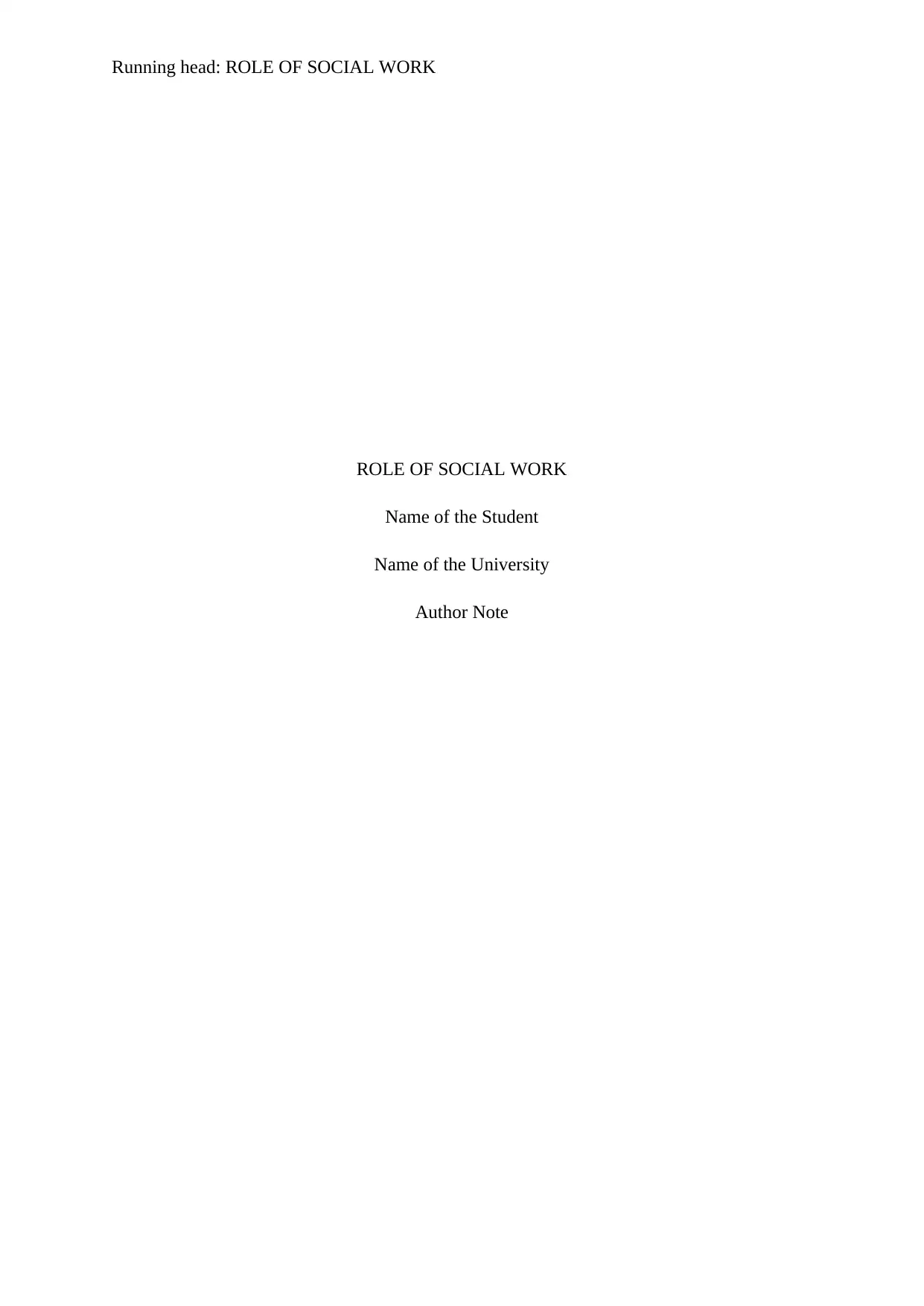
Running head: ROLE OF SOCIAL WORK
ROLE OF SOCIAL WORK
Name of the Student
Name of the University
Author Note
ROLE OF SOCIAL WORK
Name of the Student
Name of the University
Author Note
Paraphrase This Document
Need a fresh take? Get an instant paraphrase of this document with our AI Paraphraser
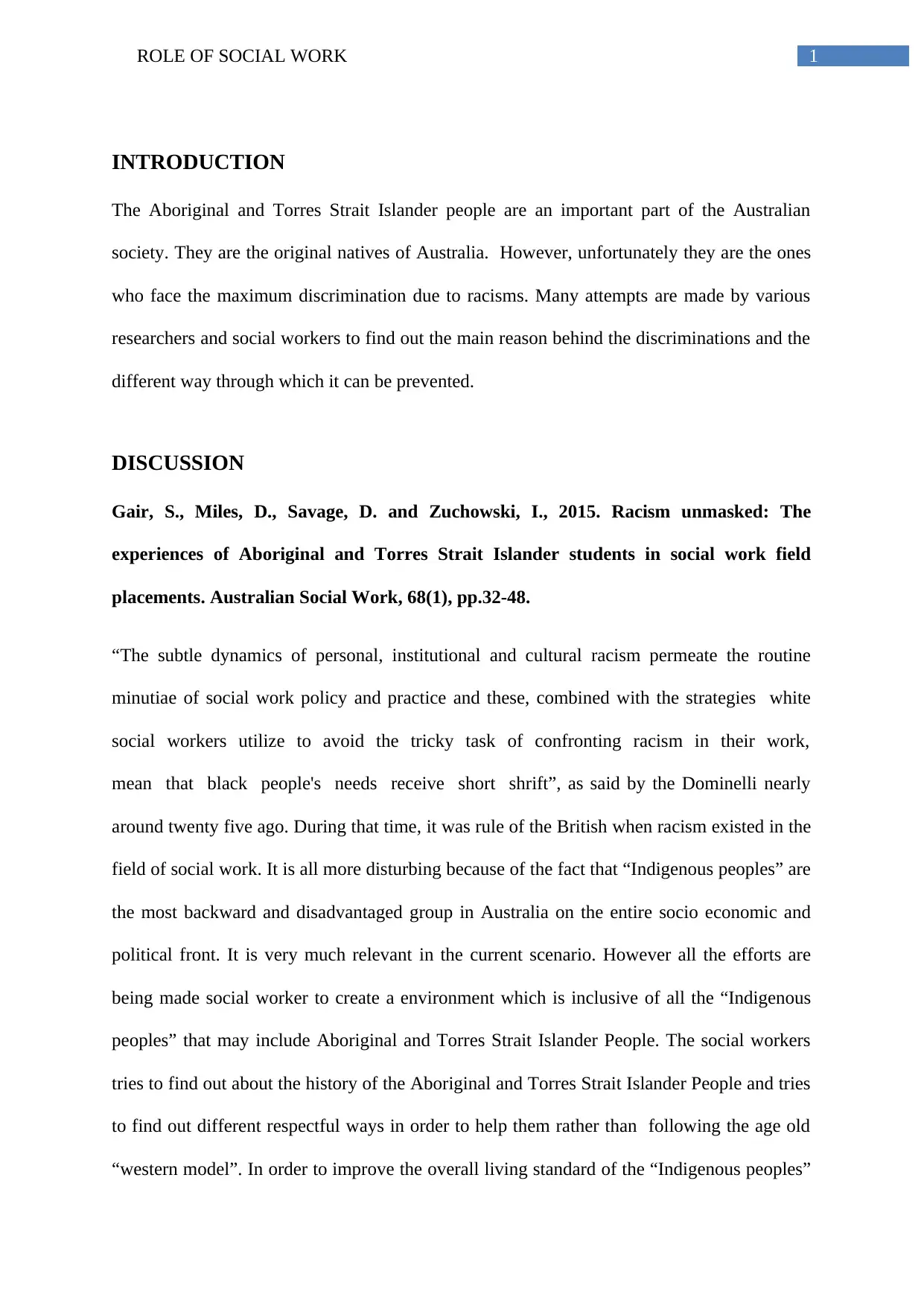
1ROLE OF SOCIAL WORK
INTRODUCTION
The Aboriginal and Torres Strait Islander people are an important part of the Australian
society. They are the original natives of Australia. However, unfortunately they are the ones
who face the maximum discrimination due to racisms. Many attempts are made by various
researchers and social workers to find out the main reason behind the discriminations and the
different way through which it can be prevented.
DISCUSSION
Gair, S., Miles, D., Savage, D. and Zuchowski, I., 2015. Racism unmasked: The
experiences of Aboriginal and Torres Strait Islander students in social work field
placements. Australian Social Work, 68(1), pp.32-48.
“The subtle dynamics of personal, institutional and cultural racism permeate the routine
minutiae of social work policy and practice and these, combined with the strategies white
social workers utilize to avoid the tricky task of confronting racism in their work,
mean that black people's needs receive short shrift”, as said by the Dominelli nearly
around twenty five ago. During that time, it was rule of the British when racism existed in the
field of social work. It is all more disturbing because of the fact that “Indigenous peoples” are
the most backward and disadvantaged group in Australia on the entire socio economic and
political front. It is very much relevant in the current scenario. However all the efforts are
being made social worker to create a environment which is inclusive of all the “Indigenous
peoples” that may include Aboriginal and Torres Strait Islander People. The social workers
tries to find out about the history of the Aboriginal and Torres Strait Islander People and tries
to find out different respectful ways in order to help them rather than following the age old
“western model”. In order to improve the overall living standard of the “Indigenous peoples”
INTRODUCTION
The Aboriginal and Torres Strait Islander people are an important part of the Australian
society. They are the original natives of Australia. However, unfortunately they are the ones
who face the maximum discrimination due to racisms. Many attempts are made by various
researchers and social workers to find out the main reason behind the discriminations and the
different way through which it can be prevented.
DISCUSSION
Gair, S., Miles, D., Savage, D. and Zuchowski, I., 2015. Racism unmasked: The
experiences of Aboriginal and Torres Strait Islander students in social work field
placements. Australian Social Work, 68(1), pp.32-48.
“The subtle dynamics of personal, institutional and cultural racism permeate the routine
minutiae of social work policy and practice and these, combined with the strategies white
social workers utilize to avoid the tricky task of confronting racism in their work,
mean that black people's needs receive short shrift”, as said by the Dominelli nearly
around twenty five ago. During that time, it was rule of the British when racism existed in the
field of social work. It is all more disturbing because of the fact that “Indigenous peoples” are
the most backward and disadvantaged group in Australia on the entire socio economic and
political front. It is very much relevant in the current scenario. However all the efforts are
being made social worker to create a environment which is inclusive of all the “Indigenous
peoples” that may include Aboriginal and Torres Strait Islander People. The social workers
tries to find out about the history of the Aboriginal and Torres Strait Islander People and tries
to find out different respectful ways in order to help them rather than following the age old
“western model”. In order to improve the overall living standard of the “Indigenous peoples”
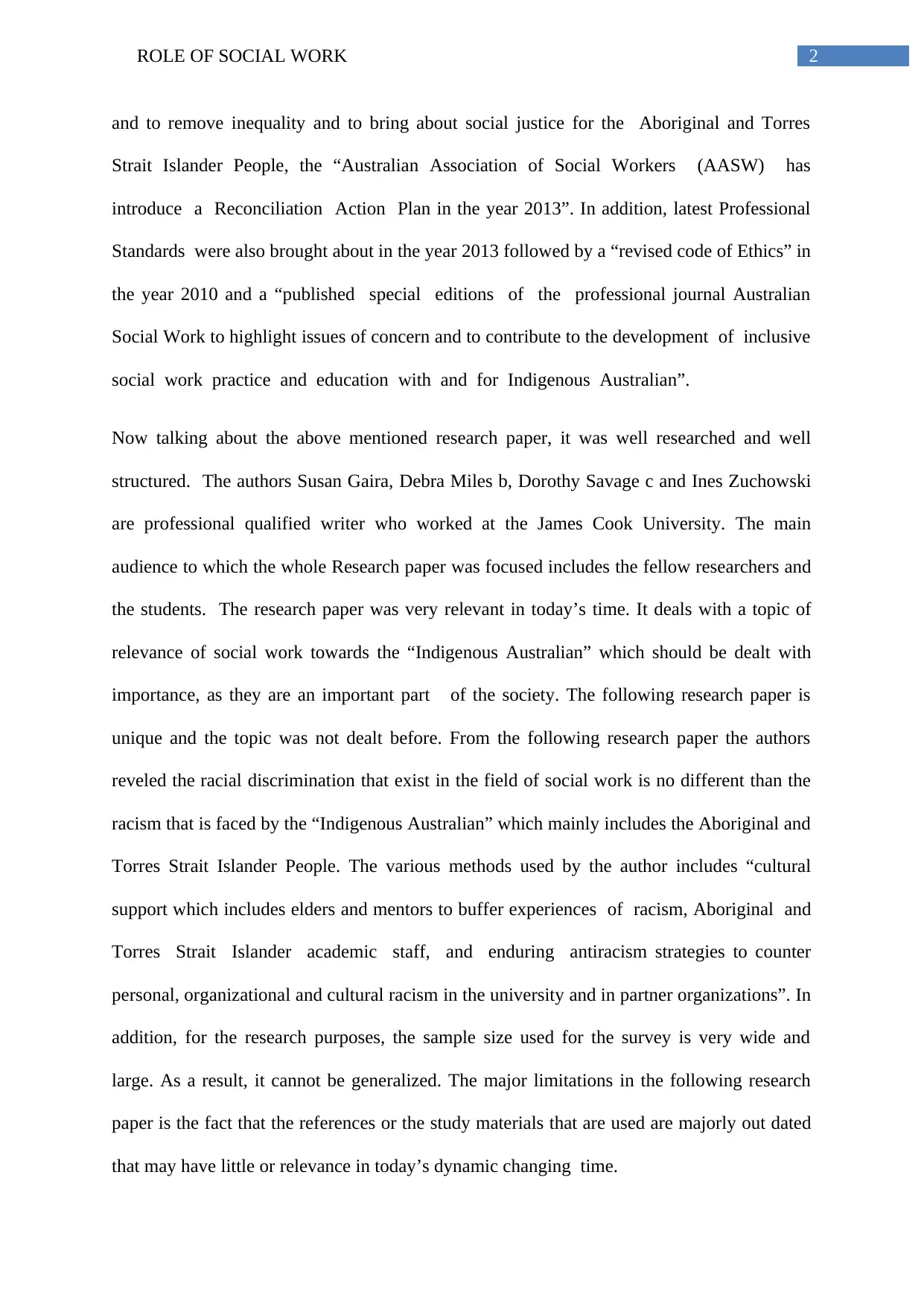
2ROLE OF SOCIAL WORK
and to remove inequality and to bring about social justice for the Aboriginal and Torres
Strait Islander People, the “Australian Association of Social Workers (AASW) has
introduce a Reconciliation Action Plan in the year 2013”. In addition, latest Professional
Standards were also brought about in the year 2013 followed by a “revised code of Ethics” in
the year 2010 and a “published special editions of the professional journal Australian
Social Work to highlight issues of concern and to contribute to the development of inclusive
social work practice and education with and for Indigenous Australian”.
Now talking about the above mentioned research paper, it was well researched and well
structured. The authors Susan Gaira, Debra Miles b, Dorothy Savage c and Ines Zuchowski
are professional qualified writer who worked at the James Cook University. The main
audience to which the whole Research paper was focused includes the fellow researchers and
the students. The research paper was very relevant in today’s time. It deals with a topic of
relevance of social work towards the “Indigenous Australian” which should be dealt with
importance, as they are an important part of the society. The following research paper is
unique and the topic was not dealt before. From the following research paper the authors
reveled the racial discrimination that exist in the field of social work is no different than the
racism that is faced by the “Indigenous Australian” which mainly includes the Aboriginal and
Torres Strait Islander People. The various methods used by the author includes “cultural
support which includes elders and mentors to buffer experiences of racism, Aboriginal and
Torres Strait Islander academic staff, and enduring antiracism strategies to counter
personal, organizational and cultural racism in the university and in partner organizations”. In
addition, for the research purposes, the sample size used for the survey is very wide and
large. As a result, it cannot be generalized. The major limitations in the following research
paper is the fact that the references or the study materials that are used are majorly out dated
that may have little or relevance in today’s dynamic changing time.
and to remove inequality and to bring about social justice for the Aboriginal and Torres
Strait Islander People, the “Australian Association of Social Workers (AASW) has
introduce a Reconciliation Action Plan in the year 2013”. In addition, latest Professional
Standards were also brought about in the year 2013 followed by a “revised code of Ethics” in
the year 2010 and a “published special editions of the professional journal Australian
Social Work to highlight issues of concern and to contribute to the development of inclusive
social work practice and education with and for Indigenous Australian”.
Now talking about the above mentioned research paper, it was well researched and well
structured. The authors Susan Gaira, Debra Miles b, Dorothy Savage c and Ines Zuchowski
are professional qualified writer who worked at the James Cook University. The main
audience to which the whole Research paper was focused includes the fellow researchers and
the students. The research paper was very relevant in today’s time. It deals with a topic of
relevance of social work towards the “Indigenous Australian” which should be dealt with
importance, as they are an important part of the society. The following research paper is
unique and the topic was not dealt before. From the following research paper the authors
reveled the racial discrimination that exist in the field of social work is no different than the
racism that is faced by the “Indigenous Australian” which mainly includes the Aboriginal and
Torres Strait Islander People. The various methods used by the author includes “cultural
support which includes elders and mentors to buffer experiences of racism, Aboriginal and
Torres Strait Islander academic staff, and enduring antiracism strategies to counter
personal, organizational and cultural racism in the university and in partner organizations”. In
addition, for the research purposes, the sample size used for the survey is very wide and
large. As a result, it cannot be generalized. The major limitations in the following research
paper is the fact that the references or the study materials that are used are majorly out dated
that may have little or relevance in today’s dynamic changing time.
⊘ This is a preview!⊘
Do you want full access?
Subscribe today to unlock all pages.

Trusted by 1+ million students worldwide
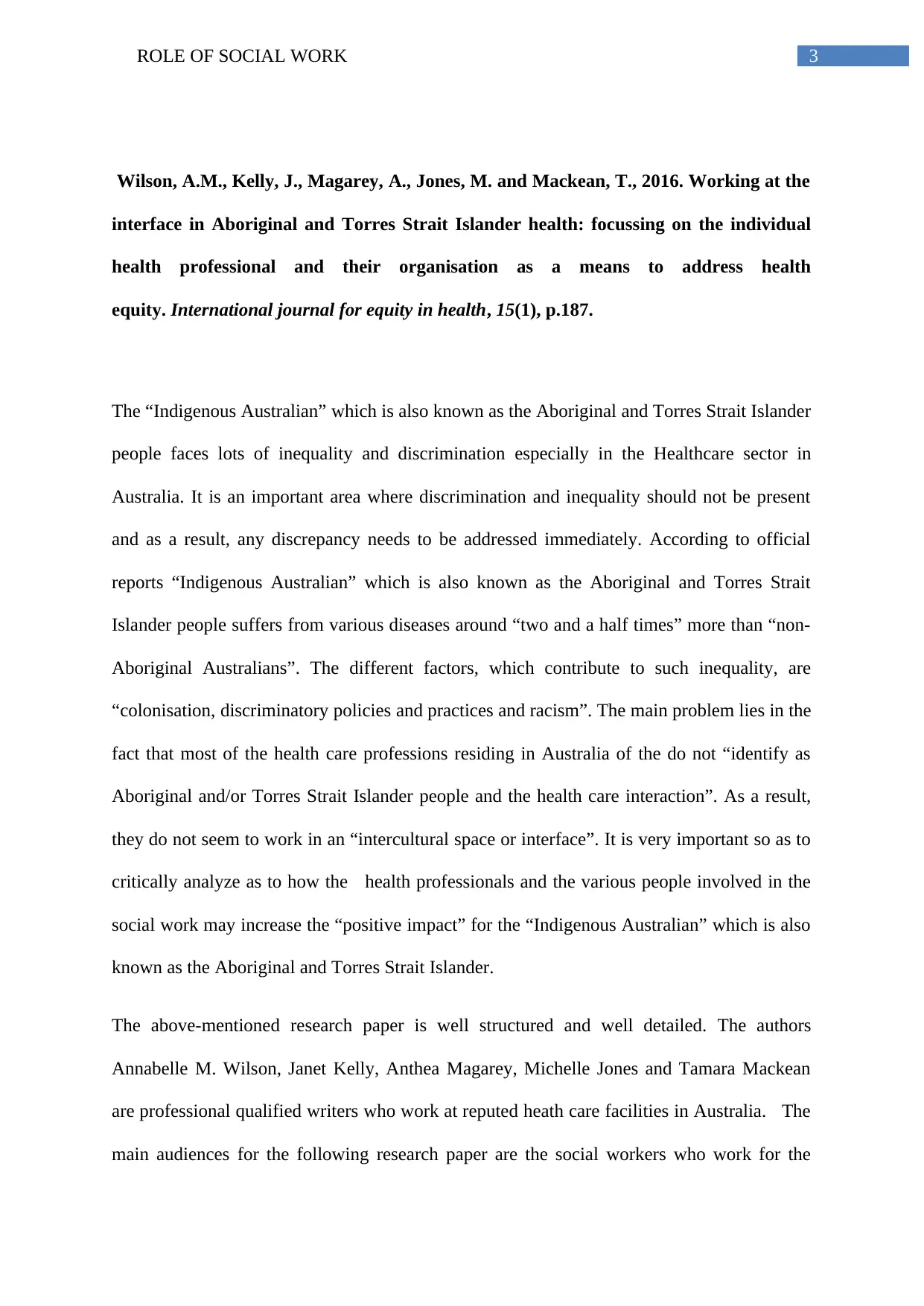
3ROLE OF SOCIAL WORK
Wilson, A.M., Kelly, J., Magarey, A., Jones, M. and Mackean, T., 2016. Working at the
interface in Aboriginal and Torres Strait Islander health: focussing on the individual
health professional and their organisation as a means to address health
equity. International journal for equity in health, 15(1), p.187.
The “Indigenous Australian” which is also known as the Aboriginal and Torres Strait Islander
people faces lots of inequality and discrimination especially in the Healthcare sector in
Australia. It is an important area where discrimination and inequality should not be present
and as a result, any discrepancy needs to be addressed immediately. According to official
reports “Indigenous Australian” which is also known as the Aboriginal and Torres Strait
Islander people suffers from various diseases around “two and a half times” more than “non-
Aboriginal Australians”. The different factors, which contribute to such inequality, are
“colonisation, discriminatory policies and practices and racism”. The main problem lies in the
fact that most of the health care professions residing in Australia of the do not “identify as
Aboriginal and/or Torres Strait Islander people and the health care interaction”. As a result,
they do not seem to work in an “intercultural space or interface”. It is very important so as to
critically analyze as to how the health professionals and the various people involved in the
social work may increase the “positive impact” for the “Indigenous Australian” which is also
known as the Aboriginal and Torres Strait Islander.
The above-mentioned research paper is well structured and well detailed. The authors
Annabelle M. Wilson, Janet Kelly, Anthea Magarey, Michelle Jones and Tamara Mackean
are professional qualified writers who work at reputed heath care facilities in Australia. The
main audiences for the following research paper are the social workers who work for the
Wilson, A.M., Kelly, J., Magarey, A., Jones, M. and Mackean, T., 2016. Working at the
interface in Aboriginal and Torres Strait Islander health: focussing on the individual
health professional and their organisation as a means to address health
equity. International journal for equity in health, 15(1), p.187.
The “Indigenous Australian” which is also known as the Aboriginal and Torres Strait Islander
people faces lots of inequality and discrimination especially in the Healthcare sector in
Australia. It is an important area where discrimination and inequality should not be present
and as a result, any discrepancy needs to be addressed immediately. According to official
reports “Indigenous Australian” which is also known as the Aboriginal and Torres Strait
Islander people suffers from various diseases around “two and a half times” more than “non-
Aboriginal Australians”. The different factors, which contribute to such inequality, are
“colonisation, discriminatory policies and practices and racism”. The main problem lies in the
fact that most of the health care professions residing in Australia of the do not “identify as
Aboriginal and/or Torres Strait Islander people and the health care interaction”. As a result,
they do not seem to work in an “intercultural space or interface”. It is very important so as to
critically analyze as to how the health professionals and the various people involved in the
social work may increase the “positive impact” for the “Indigenous Australian” which is also
known as the Aboriginal and Torres Strait Islander.
The above-mentioned research paper is well structured and well detailed. The authors
Annabelle M. Wilson, Janet Kelly, Anthea Magarey, Michelle Jones and Tamara Mackean
are professional qualified writers who work at reputed heath care facilities in Australia. The
main audiences for the following research paper are the social workers who work for the
Paraphrase This Document
Need a fresh take? Get an instant paraphrase of this document with our AI Paraphraser
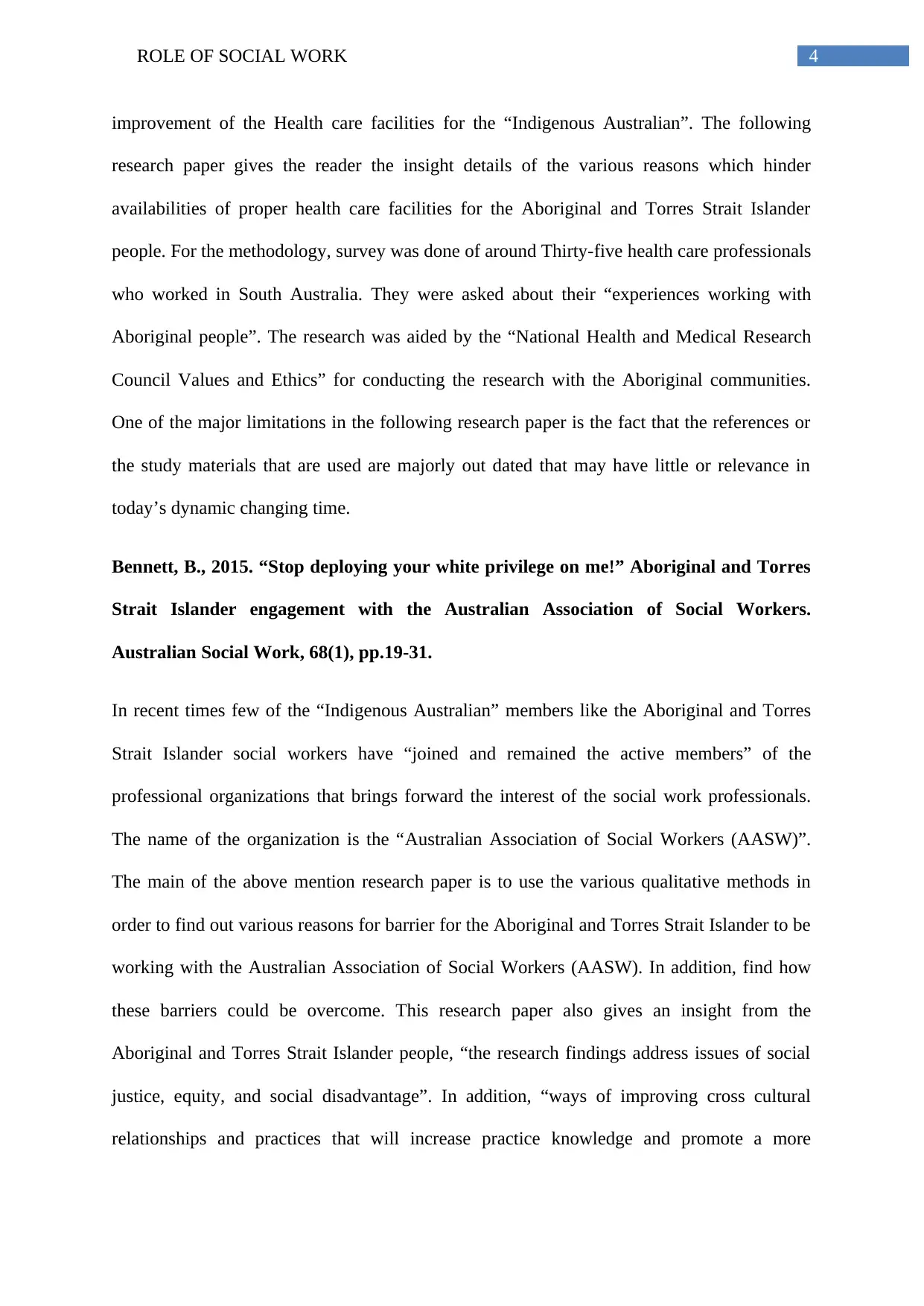
4ROLE OF SOCIAL WORK
improvement of the Health care facilities for the “Indigenous Australian”. The following
research paper gives the reader the insight details of the various reasons which hinder
availabilities of proper health care facilities for the Aboriginal and Torres Strait Islander
people. For the methodology, survey was done of around Thirty-five health care professionals
who worked in South Australia. They were asked about their “experiences working with
Aboriginal people”. The research was aided by the “National Health and Medical Research
Council Values and Ethics” for conducting the research with the Aboriginal communities.
One of the major limitations in the following research paper is the fact that the references or
the study materials that are used are majorly out dated that may have little or relevance in
today’s dynamic changing time.
Bennett, B., 2015. “Stop deploying your white privilege on me!” Aboriginal and Torres
Strait Islander engagement with the Australian Association of Social Workers.
Australian Social Work, 68(1), pp.19-31.
In recent times few of the “Indigenous Australian” members like the Aboriginal and Torres
Strait Islander social workers have “joined and remained the active members” of the
professional organizations that brings forward the interest of the social work professionals.
The name of the organization is the “Australian Association of Social Workers (AASW)”.
The main of the above mention research paper is to use the various qualitative methods in
order to find out various reasons for barrier for the Aboriginal and Torres Strait Islander to be
working with the Australian Association of Social Workers (AASW). In addition, find how
these barriers could be overcome. This research paper also gives an insight from the
Aboriginal and Torres Strait Islander people, “the research findings address issues of social
justice, equity, and social disadvantage”. In addition, “ways of improving cross cultural
relationships and practices that will increase practice knowledge and promote a more
improvement of the Health care facilities for the “Indigenous Australian”. The following
research paper gives the reader the insight details of the various reasons which hinder
availabilities of proper health care facilities for the Aboriginal and Torres Strait Islander
people. For the methodology, survey was done of around Thirty-five health care professionals
who worked in South Australia. They were asked about their “experiences working with
Aboriginal people”. The research was aided by the “National Health and Medical Research
Council Values and Ethics” for conducting the research with the Aboriginal communities.
One of the major limitations in the following research paper is the fact that the references or
the study materials that are used are majorly out dated that may have little or relevance in
today’s dynamic changing time.
Bennett, B., 2015. “Stop deploying your white privilege on me!” Aboriginal and Torres
Strait Islander engagement with the Australian Association of Social Workers.
Australian Social Work, 68(1), pp.19-31.
In recent times few of the “Indigenous Australian” members like the Aboriginal and Torres
Strait Islander social workers have “joined and remained the active members” of the
professional organizations that brings forward the interest of the social work professionals.
The name of the organization is the “Australian Association of Social Workers (AASW)”.
The main of the above mention research paper is to use the various qualitative methods in
order to find out various reasons for barrier for the Aboriginal and Torres Strait Islander to be
working with the Australian Association of Social Workers (AASW). In addition, find how
these barriers could be overcome. This research paper also gives an insight from the
Aboriginal and Torres Strait Islander people, “the research findings address issues of social
justice, equity, and social disadvantage”. In addition, “ways of improving cross cultural
relationships and practices that will increase practice knowledge and promote a more
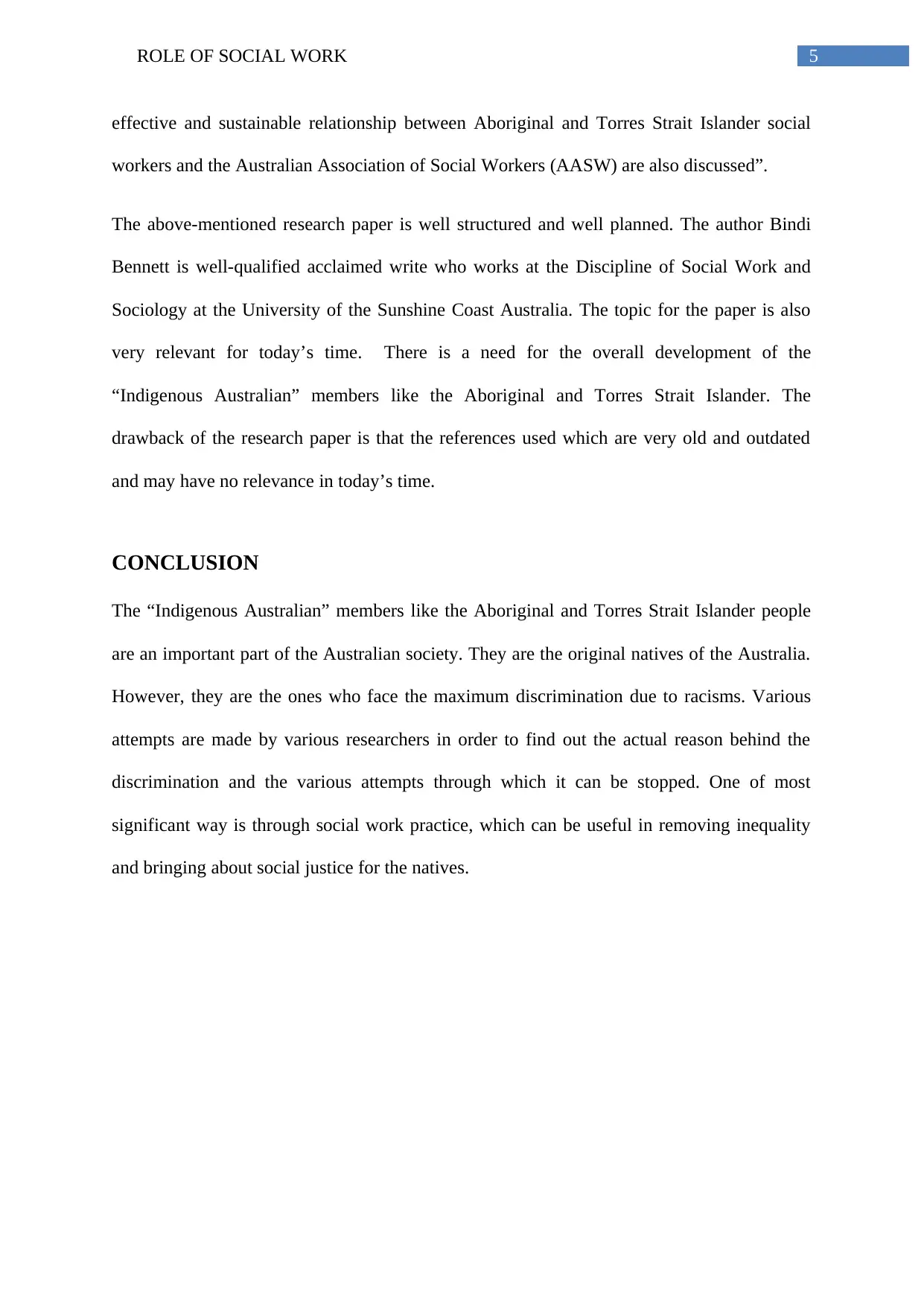
5ROLE OF SOCIAL WORK
effective and sustainable relationship between Aboriginal and Torres Strait Islander social
workers and the Australian Association of Social Workers (AASW) are also discussed”.
The above-mentioned research paper is well structured and well planned. The author Bindi
Bennett is well-qualified acclaimed write who works at the Discipline of Social Work and
Sociology at the University of the Sunshine Coast Australia. The topic for the paper is also
very relevant for today’s time. There is a need for the overall development of the
“Indigenous Australian” members like the Aboriginal and Torres Strait Islander. The
drawback of the research paper is that the references used which are very old and outdated
and may have no relevance in today’s time.
CONCLUSION
The “Indigenous Australian” members like the Aboriginal and Torres Strait Islander people
are an important part of the Australian society. They are the original natives of the Australia.
However, they are the ones who face the maximum discrimination due to racisms. Various
attempts are made by various researchers in order to find out the actual reason behind the
discrimination and the various attempts through which it can be stopped. One of most
significant way is through social work practice, which can be useful in removing inequality
and bringing about social justice for the natives.
effective and sustainable relationship between Aboriginal and Torres Strait Islander social
workers and the Australian Association of Social Workers (AASW) are also discussed”.
The above-mentioned research paper is well structured and well planned. The author Bindi
Bennett is well-qualified acclaimed write who works at the Discipline of Social Work and
Sociology at the University of the Sunshine Coast Australia. The topic for the paper is also
very relevant for today’s time. There is a need for the overall development of the
“Indigenous Australian” members like the Aboriginal and Torres Strait Islander. The
drawback of the research paper is that the references used which are very old and outdated
and may have no relevance in today’s time.
CONCLUSION
The “Indigenous Australian” members like the Aboriginal and Torres Strait Islander people
are an important part of the Australian society. They are the original natives of the Australia.
However, they are the ones who face the maximum discrimination due to racisms. Various
attempts are made by various researchers in order to find out the actual reason behind the
discrimination and the various attempts through which it can be stopped. One of most
significant way is through social work practice, which can be useful in removing inequality
and bringing about social justice for the natives.
⊘ This is a preview!⊘
Do you want full access?
Subscribe today to unlock all pages.

Trusted by 1+ million students worldwide
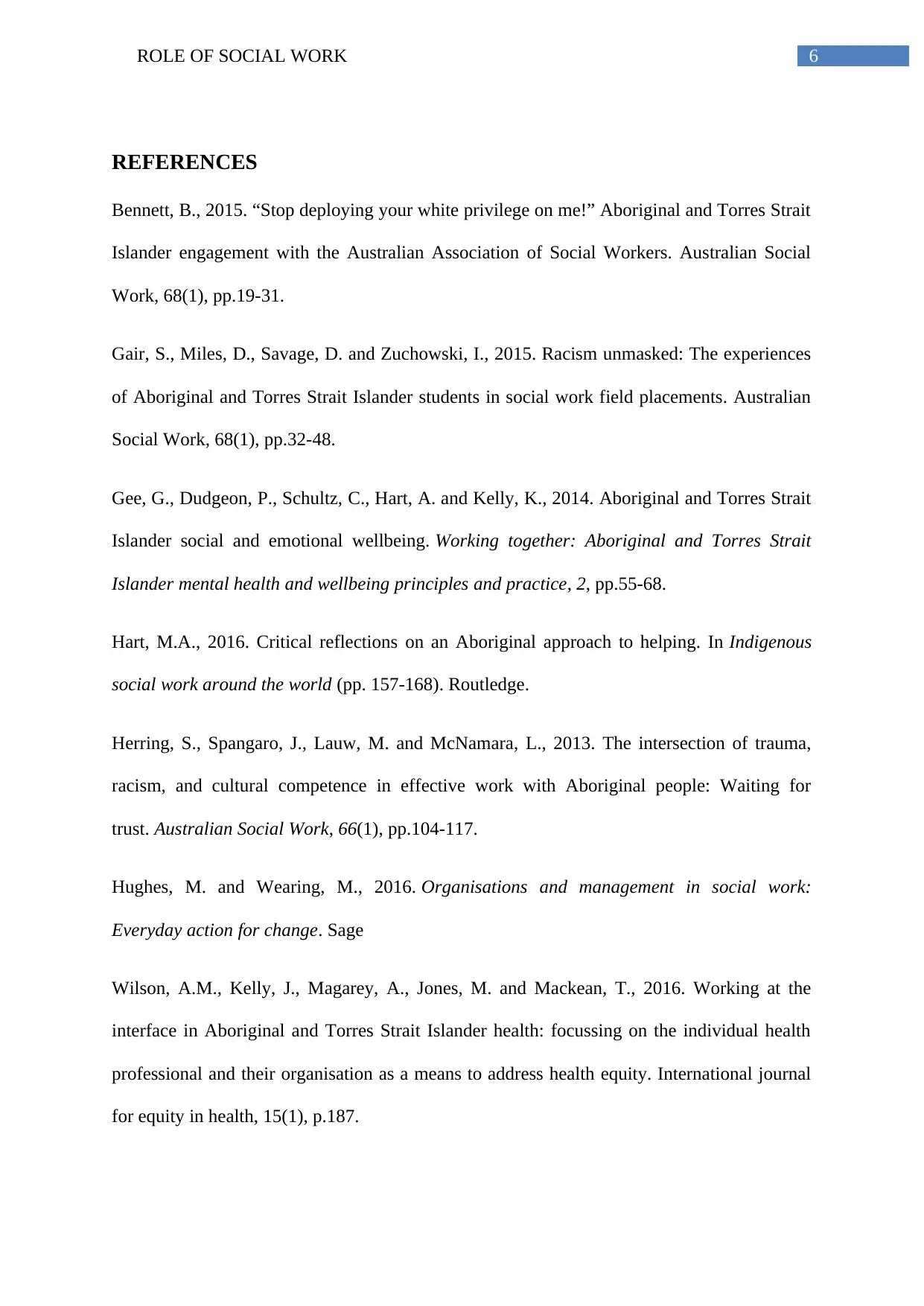
6ROLE OF SOCIAL WORK
REFERENCES
Bennett, B., 2015. “Stop deploying your white privilege on me!” Aboriginal and Torres Strait
Islander engagement with the Australian Association of Social Workers. Australian Social
Work, 68(1), pp.19-31.
Gair, S., Miles, D., Savage, D. and Zuchowski, I., 2015. Racism unmasked: The experiences
of Aboriginal and Torres Strait Islander students in social work field placements. Australian
Social Work, 68(1), pp.32-48.
Gee, G., Dudgeon, P., Schultz, C., Hart, A. and Kelly, K., 2014. Aboriginal and Torres Strait
Islander social and emotional wellbeing. Working together: Aboriginal and Torres Strait
Islander mental health and wellbeing principles and practice, 2, pp.55-68.
Hart, M.A., 2016. Critical reflections on an Aboriginal approach to helping. In Indigenous
social work around the world (pp. 157-168). Routledge.
Herring, S., Spangaro, J., Lauw, M. and McNamara, L., 2013. The intersection of trauma,
racism, and cultural competence in effective work with Aboriginal people: Waiting for
trust. Australian Social Work, 66(1), pp.104-117.
Hughes, M. and Wearing, M., 2016. Organisations and management in social work:
Everyday action for change. Sage
Wilson, A.M., Kelly, J., Magarey, A., Jones, M. and Mackean, T., 2016. Working at the
interface in Aboriginal and Torres Strait Islander health: focussing on the individual health
professional and their organisation as a means to address health equity. International journal
for equity in health, 15(1), p.187.
REFERENCES
Bennett, B., 2015. “Stop deploying your white privilege on me!” Aboriginal and Torres Strait
Islander engagement with the Australian Association of Social Workers. Australian Social
Work, 68(1), pp.19-31.
Gair, S., Miles, D., Savage, D. and Zuchowski, I., 2015. Racism unmasked: The experiences
of Aboriginal and Torres Strait Islander students in social work field placements. Australian
Social Work, 68(1), pp.32-48.
Gee, G., Dudgeon, P., Schultz, C., Hart, A. and Kelly, K., 2014. Aboriginal and Torres Strait
Islander social and emotional wellbeing. Working together: Aboriginal and Torres Strait
Islander mental health and wellbeing principles and practice, 2, pp.55-68.
Hart, M.A., 2016. Critical reflections on an Aboriginal approach to helping. In Indigenous
social work around the world (pp. 157-168). Routledge.
Herring, S., Spangaro, J., Lauw, M. and McNamara, L., 2013. The intersection of trauma,
racism, and cultural competence in effective work with Aboriginal people: Waiting for
trust. Australian Social Work, 66(1), pp.104-117.
Hughes, M. and Wearing, M., 2016. Organisations and management in social work:
Everyday action for change. Sage
Wilson, A.M., Kelly, J., Magarey, A., Jones, M. and Mackean, T., 2016. Working at the
interface in Aboriginal and Torres Strait Islander health: focussing on the individual health
professional and their organisation as a means to address health equity. International journal
for equity in health, 15(1), p.187.
Paraphrase This Document
Need a fresh take? Get an instant paraphrase of this document with our AI Paraphraser
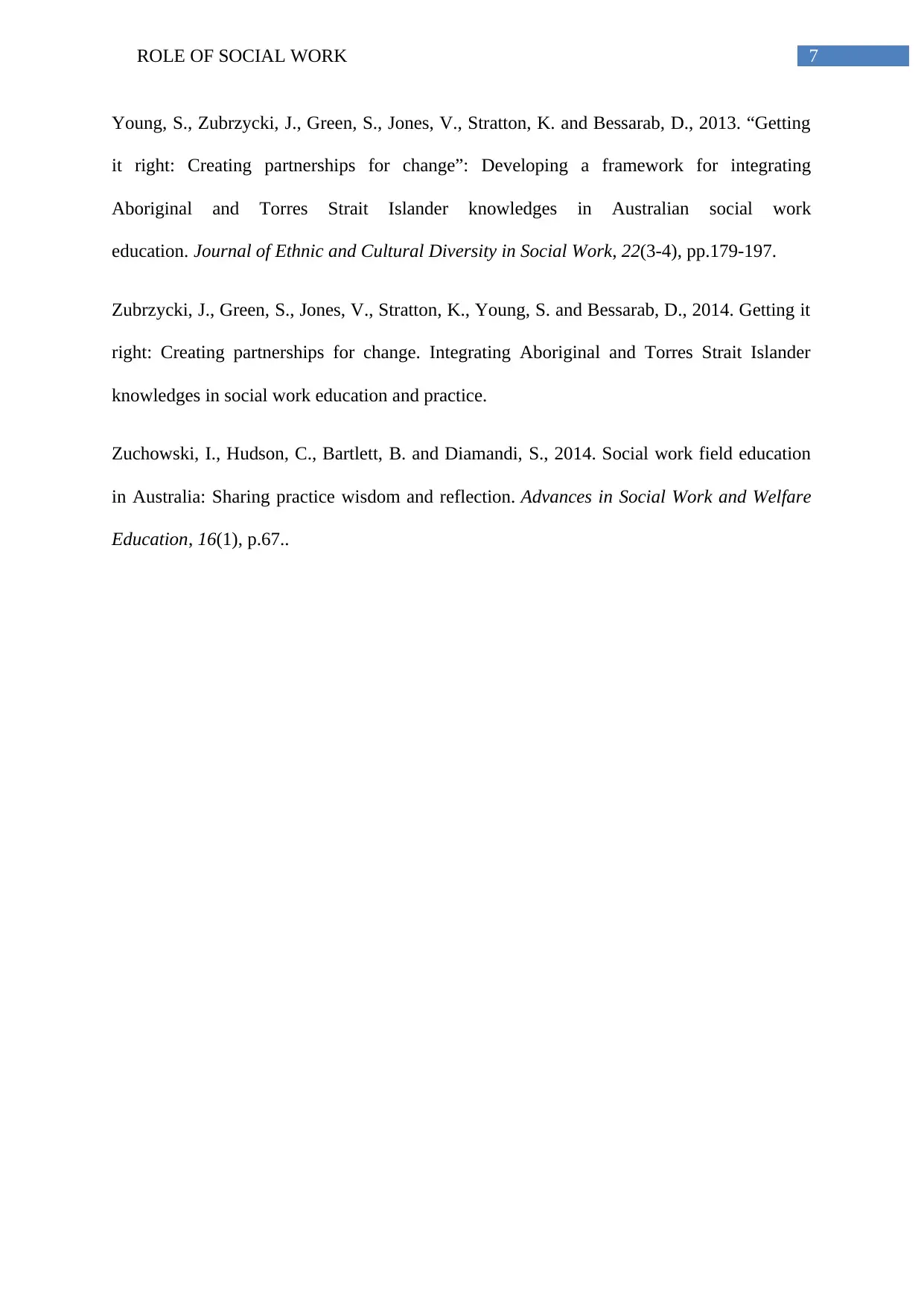
7ROLE OF SOCIAL WORK
Young, S., Zubrzycki, J., Green, S., Jones, V., Stratton, K. and Bessarab, D., 2013. “Getting
it right: Creating partnerships for change”: Developing a framework for integrating
Aboriginal and Torres Strait Islander knowledges in Australian social work
education. Journal of Ethnic and Cultural Diversity in Social Work, 22(3-4), pp.179-197.
Zubrzycki, J., Green, S., Jones, V., Stratton, K., Young, S. and Bessarab, D., 2014. Getting it
right: Creating partnerships for change. Integrating Aboriginal and Torres Strait Islander
knowledges in social work education and practice.
Zuchowski, I., Hudson, C., Bartlett, B. and Diamandi, S., 2014. Social work field education
in Australia: Sharing practice wisdom and reflection. Advances in Social Work and Welfare
Education, 16(1), p.67..
Young, S., Zubrzycki, J., Green, S., Jones, V., Stratton, K. and Bessarab, D., 2013. “Getting
it right: Creating partnerships for change”: Developing a framework for integrating
Aboriginal and Torres Strait Islander knowledges in Australian social work
education. Journal of Ethnic and Cultural Diversity in Social Work, 22(3-4), pp.179-197.
Zubrzycki, J., Green, S., Jones, V., Stratton, K., Young, S. and Bessarab, D., 2014. Getting it
right: Creating partnerships for change. Integrating Aboriginal and Torres Strait Islander
knowledges in social work education and practice.
Zuchowski, I., Hudson, C., Bartlett, B. and Diamandi, S., 2014. Social work field education
in Australia: Sharing practice wisdom and reflection. Advances in Social Work and Welfare
Education, 16(1), p.67..
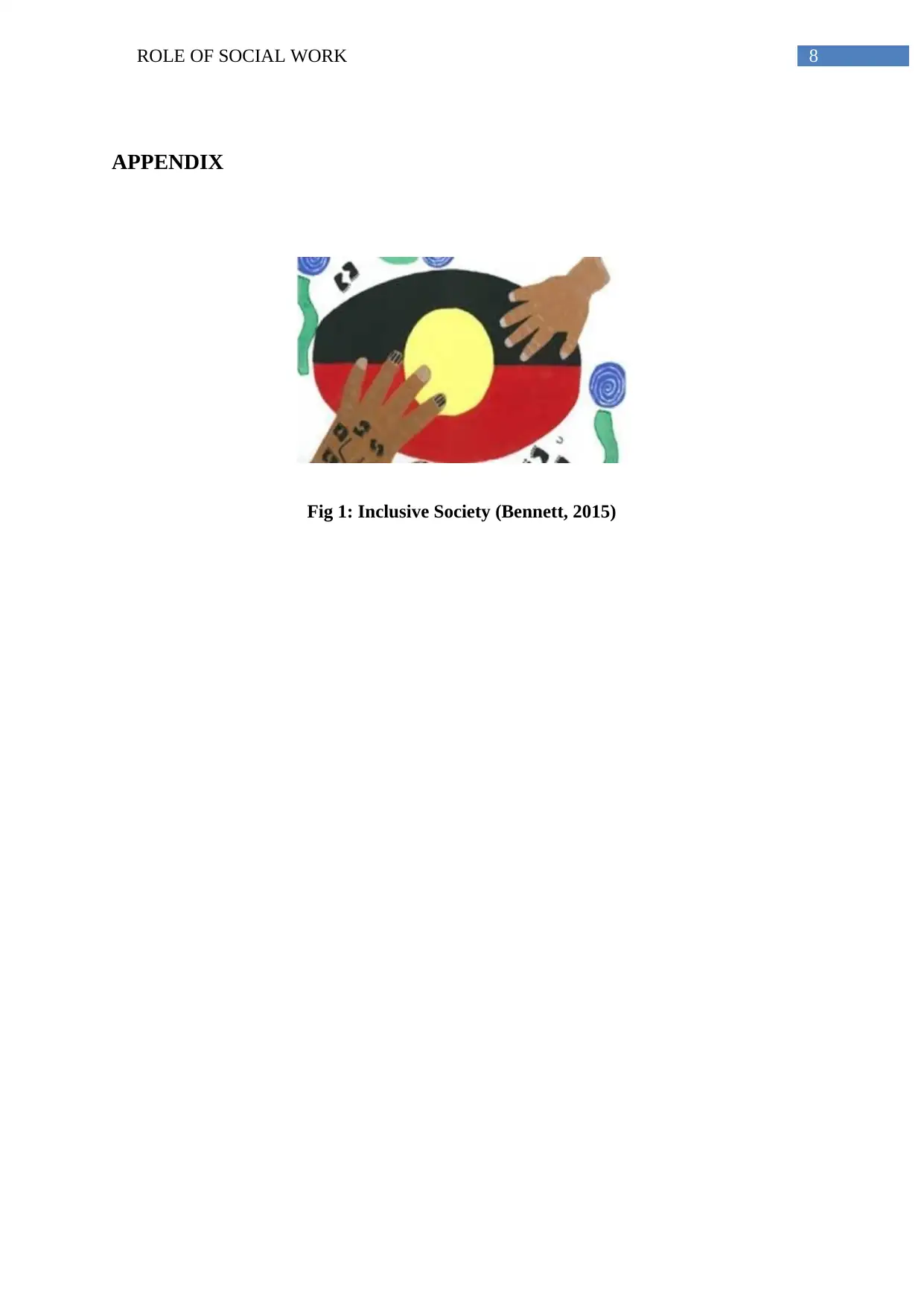
8ROLE OF SOCIAL WORK
APPENDIX
Fig 1: Inclusive Society (Bennett, 2015)
APPENDIX
Fig 1: Inclusive Society (Bennett, 2015)
⊘ This is a preview!⊘
Do you want full access?
Subscribe today to unlock all pages.

Trusted by 1+ million students worldwide
1 out of 9
Related Documents
Your All-in-One AI-Powered Toolkit for Academic Success.
+13062052269
info@desklib.com
Available 24*7 on WhatsApp / Email
![[object Object]](/_next/static/media/star-bottom.7253800d.svg)
Unlock your academic potential
Copyright © 2020–2026 A2Z Services. All Rights Reserved. Developed and managed by ZUCOL.





